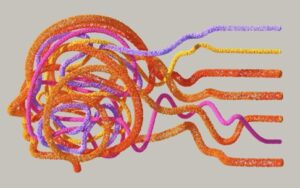 In the news of late: TikTok under fire, with the U.S. House of Representatives, in March, approving a bi-partisan bill that would force its parent company, ByteDance, to either sell the app or be banned on all of our devices.
In the news of late: TikTok under fire, with the U.S. House of Representatives, in March, approving a bi-partisan bill that would force its parent company, ByteDance, to either sell the app or be banned on all of our devices.
As noted by Ryan Lovelace of The Washington Times: “TikTok is under intense scrutiny on Capitol Hill, where the director of the FBI, the former head of the CIA, and parents of suffering children are all sounding an alarm about the China-founded app.”
And yet, as reported by Education Week’s Alyson Klein, a recent study by the University of North Arizona and others found that today’s teachers spend, on average, two hours a day on TikTok…
Nevertheless, she notes:
- 53% of teachers are unaware of their school’s TikTok use policies; 13% are just minimally aware.
- 94% use the platform to find education-related ideas.
- 90% use it to inform their classroom practice.
- 79% say it helps them better understand youth culture; and
- 60% use it to network.
Teachers are turning to Artificial Intelligence in a big way, too.
Retired educator and host of the Curmudgucation blog, Peter Greene, writes that teachers should be wary of Artificial Intelligence-generated lesson plans. Called YourWai, it claims that it “specializes in learning for educators that works/inspires/motivates/empowers.”
Greene goes on to say that it promises “to do lots of things so teachers can get 90% of your work done in 10% of the time,” and calls itself “A game-changer that gives teachers more time to think creatively.”
And as if that’s not enough to garner takers, YourWai’s LinkedIn profile boasts: “Shaping the Future of Learning: LINC supports the development of equitable, student-centered learning by helping educators successfully shift to blended, project-based, and other innovative learning models.”
Do you really want a machine to push out the lessons taught by your child’s teacher, or you, if an educator?
Meanwhile, it turns out that teachers are also embracing ChatGPT to help grade writing assignments via Houghton Mifflin Harcourt’s Writable. Axios’s Jennifer A. Kingson explains that it’s billed as “a time-saving tool for teachers.”
Easy-peasy:
- “The teacher submits the essays to Writable, which in turn runs them through ChatGPT.
- ChatGPT offers comments and observations to the teacher, who is supposed to review and tweak them before sending the feedback to the students.
- Writable also ‘tokenizes’ students’ information, so that no personally identifying details are submitted to the AI program.”
Teaching used to be personal, nothing artificial about it…
Rather ironically, recent EdWeek Research Center surveys find that:
- 69% of responding teachers “expect Artificial Intelligence will have a negative impact on teens’ mental health over the next decade.
- 24% say it will have a “very negative” impact.
- 14% expect positive effects, and
- 1% said, “very positive” effects.
And now comes this: The 2025 Program for International Student Assessment, PISA, will add an AI-powered twist.
According to Andreas Schleicher, the director for education and skills and OCED’s special advisor on education policy to its secretary-general: “We are going to incorporate giving them [students] tasks to learn and we’re going to track how they approached the assignment, to get a sense of how students think critically and creatively.”
He explains: “Students would be able to use an AI-powered chatbot to complete their work. They could ask it basic questions about a topic, so that the test could focus on their thinking capability, not whether they possess background knowledge of a particular subject.”
Calls to mind Aldous Huxley’s Brave New World, whose “main message,” says study.com’s Jennifer Carnevale, “is a warning to all that advanced technology could take over and humans could lose their humanity.”
And you say?
~ With thanks, Carol